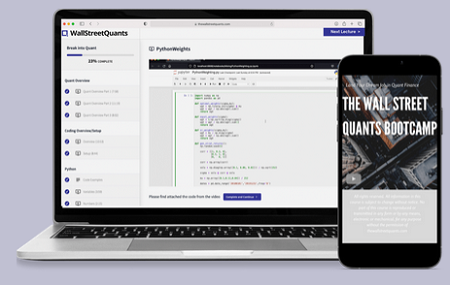A bootcamp run by Wall Street quants to break you into top tier hedge funds, HFTs, investment banks and more.

Senior quants from top shops like Point72, Millennium, SIG (and more) show you how to land leading roles.
Access mentors from top firms through discord and mentorship calls. Chat about anything – from python questions to career advice – and stay on the right track.
Collaborate with a like-minded, motivated group building a career in quant. Share career tips, interview/recruiting insights, talk shop or network.
.png)

Impress employers by completing a side project they’d want done themselves. You’ll research and deploy a full-fledged quant strategy (on real money).
Our program teaches all the skills you need for quant (including coding) from the ground up, and mimics the training you would get within the first 2 years at a top-tier firm.
Craft the perfect resume with feedback from insiders. Learn how your candidacy is actually viewed by quant firms and tell your story persuasively.
Prep for interviews efficiently with mock interviews, methods for cracking the technical component, strategies for the behavioral section, and guidance on take-home interview-projects (with samples).
Get insider knowledge on various firms, roles/teams and headhunters. Get insights on where and how to apply given your background.
Anyone who wants to advance their career in quant finance
Undergraduate Students
Undergraduates looking for an internship or full-time role
Graduate Students
Masters or phd students looking for an internship or full-time role
Career Switchers
Candidates from different industries (i.e. tech) looking to move into quant
Current Quants
Quants who want to excel on the job and get ahead
No more guessing which major or courses you need. Follow a curriculum designed by Wall Street quants to give you the right skills. By the end, you’ll be able to research & code quant strategies like the hedge funds.
We guide you through a 30,000 foot tour of quant research & trading. Develop a high-level understanding of key concepts before we dive into the fine details.
Sub-topics: backtesting, overfitting, idea generation, types of quant strategies, the major quant firms
Learn the most widely used coding language by quants today: Python. We teach it from the ground up with attention to the specific skills & libraries desired by quant firms. There are lots of practical code examples (focusing on quant applications) and interactive exercises designed to bring you up to speed even if you don’t have a coding background.
Sub-topics: python, numpy, pandas, data analysis, data sources, plotting
Quants have a rigorous framework for deciding if a strategy is any good. You can’t manage what you don’t measure! Learn the current industry-standard techniques & metrics used in strategy evaluation.
Sub-topics: sharpe ratios, regressions, volatility, returns, drawdowns, alpha, beta
Mature quant models are often combinations of many (sometimes hundreds!) underlying strategies. Understand best-practices for building powerful quant models by optimally combining individual strategies.
Sub-topics: correlation, breadth, covariance matrix, volatility-weighting, risk-parity, sharpe ratio – weighting, generalized weighting, robust weighting
You’ve found a dataset / signal that you think predicts returns. Now, how do you robustly and accurately express this signal as a tradable portfolio of securities?
Sub-topics: signal transformations, cross-sectional (XS) models, time-series (TS) models, implementation
Backtesting, the art & science of simulating your strategy with historical data, is the bread and butter of quant. We teach the two types of backtesting used in the quant workflow.
Sub-topics: unconstrained backtests, optimized backtests
Conducting “alpha” research to discover new strategies is an art! Learn industry best-practices and how to avoid common pitfalls (including overfitting).
Sub-topics: overfitting, out of sample testing, priors, model complexity, the utility of machine learning
Learn the main strategy types used in industry today and leave with a powerful arsenal! There’s a focus on stronger “statistical arbitrage” strategies. We also teach methods/frameworks for improving strategies and taking them to the next level.
Sub-topics: event-driven, momentum, reversal, pairs trading, statistical arbitrage, value, crypto strategies
We guide you through a project that mimics the actual work you’d do at a quant hedge fund.
The goal is to develop a statistical arbitrage strategy in cryptocurrencies. We provide a research outline for the project, including a framework for building profitable mean-reversion & momentum strategies. Ambitious students can deploy their strategy on real money using code provided at the end of the course in Part 13.
Trading costs can make or break a strategy, especially for higher frequency “statistical arbitrage” strategies. Learn the main types of trading costs and how to incorporate them in backtests. We further explore transaction cost modeling and methods for minimizing costs.
Sub-topics: commissions, slippage, bid-ask spread, turnover, transaction cost modeling, portfolio optimization
Understand different risk sources (“factors”) beyond the market (“beta”), how to measure them and how to immunize (“neutralize”) your portfolio to them to build a more robust strategy.
Sub-topics: risk factors, barra risk models, fama-french factor models, beta/loading, risk contribution, risk-neutralization
Most quants use an optimization as the “final step” in forming portfolios. Optimizers strategically balance return, risk, transaction costs and portfolio constraints (IE. long-only). Learn how to implement one from scratch using convex-optimization and the cvxpy library.
Sub-topics: mean-variance optimization, convex optimization, cvxpy, transaction cost models, portfolio constraints
We wrap up the course by walking you through the code for a flexible python trading library that allows for live trading (and backtesting) fully-automated quant strategies on real money. Learn how to implement a robust end-to-end production trading system, and impress employers by building a live personal track-record.
Sub-topics: order management, live data feeds, broker APIs, logging
Our bootcamp features a project designed to set your resume apart. You’ll build a realistic quant strategy employers would want themselves. Ambitious students can stand out by using our python trading library to deploy your new strategy on real money and showcase a profitable track record.
.png)
Here’s What You’ll Get in The Wall Street Quants BootCamp
There are no reviews yet.
You must be <a href="https://wislibrary.org/my-account/">logged in</a> to post a review.